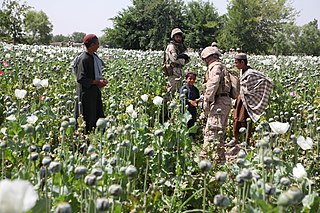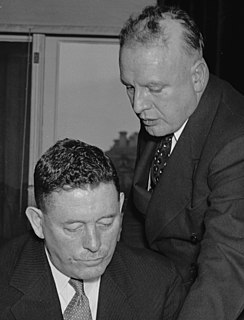Related Research Articles

The term narcotic originally referred medically to any psychoactive compound with numbing or paralyzing properties. In the United States, it has since become associated with opiates and opioids, commonly morphine and heroin, as well as derivatives of many of the compounds found within raw opium latex. The primary three are morphine, codeine, and thebaine.

The United Nations Office on Drugs and Crime is a United Nations office that was established in 1997 as the Office for Drug Control and Crime Prevention by combining the United Nations International Drug Control Program (UNDCP) and the Crime Prevention and Criminal Justice Division in the United Nations Office at Vienna. and was renamed the United Nations Office on Drugs and Crime in 2002.

The Single Convention on Narcotic Drugs of 1961 is an international treaty that prohibits production and supply of specific narcotic drugs and licenses other drugs with similar effects for medical treatment and research. The treaty updated the Paris Convention of 13 July 1931, to include the vast number of synthetic opioids invented in the intervening 30 years and to add a mechanism for more easily including new ones. From 1931 to 1961, most of the families of synthetic opioids had been developed, including drugs related to methadone, pethidine (meperidine/Demerol), morphinans, and dextromoramide. Research on fentanyls and piritramide was also nearing fruition at that point.
The International Narcotics Control Board (INCB) is an independent treaty body, one of the four treaty-mandated bodies under international drug control law.
The International Opium Convention, signed at The Hague on January 23, 1912 during the First International Opium Conference, was the first international drug control treaty. The United States was unsuccessful in its attempts to have cannabis included in the 1912 Convention. It was registered in League of Nations Treaty Series on January 23, 1922. The United States convened a 13-nation conference of the International Opium Commission in 1909 in Shanghai, China, in response to increasing criticism of the opium trade. The treaty was signed by Germany, the United States, China, France, the United Kingdom, Italy, Japan, the Netherlands, Persia, Portugal, Russia, and Siam. The Convention provided, "The contracting Powers shall use their best endeavours to control, or to cause to be controlled, all persons manufacturing, importing, selling, distributing, and exporting morphine, cocaine, and their respective salts, as well as the buildings in which these persons carry such an industry or trade."

The Narcotic Drugs and Psychotropic Substances Act, 1985, commonly referred to as the NDPS Act, is an Act of the Parliament of India that prohibits a person the production/manufacturing/cultivation, possession, sale, purchasing, transport, storage, and/or consumption of any narcotic drug or psychotropic substance. The bill was introduced in the Lok Sabha on 23 August 1985. It was passed by both the Houses of Parliament, received assent from then President Giani Zail Singh on 16 September 1985, and came into force on 14 November 1985. The NDPS Act has since been amended four times — in 1988, 2001, 2014 and 2021. The Act extends to the whole of India and it applies also to all Indian citizens outside India and to all persons on ships and aircraft registered in India.

The United Nations Convention Against Illicit Traffic in Narcotic Drugs and Psychotropic Substances of 1988 is one of three major drug control treaties currently in force. It provides additional legal mechanisms for enforcing the 1961 Single Convention on Narcotic Drugs and the 1971 Convention on Psychotropic Substances. The Convention entered into force on November 11, 1990. As of June 2020, there are 191 Parties to the Convention. These include 186 out of 193 United Nations member states and the Holy See, the European Union, the Cook Islands, Niue, and the State of Palestine.

The United Nations Commission on Narcotic Drugs (CND) is one of the functional commissions of the United Nations Economic and Social Council (ECOSOC), and is the central drug policy-making body within the United Nations System. The CND has important functions under the various international drug control conventions.

The Protocol Amending the Agreements, Conventions and Protocols on Narcotic Drugs concluded at The Hague on 23 January 1912, at Geneva on 11 February 1925 and 19 February 1925, and 13 July 1931, at Bangkok on 27 November 1931 and at Geneva on 26 June 1936 was a treaty, signed on 11 December 1946 at Lake Success, that shifted the drug control functions previously assigned to the League of Nations to the United Nations. As the Protocol's official title says, it modifies the provisions of the:
The Protocol for Limiting and Regulating the Cultivation of the Poppy Plant, the Production of, International and Wholesale Trade in, and Use of Opium, signed on 23 June 1953 in New York City, was a drug control treaty, promoted by Harry J. Anslinger, with the purpose of imposing stricter controls on opium production.

The Controlled Substances Penalties Amendments Act of 1984, 98 Stat. 2068, generally enhanced the penalties for violations of the Comprehensive Drug Abuse Prevention and Control Act of 1970. The 1984 legislation removed an ambiguity in the then-existing law by providing that a State drug felony conviction would trigger the provisions enhancing penalties for recidivists; it went further by providing that a Foreign drug felony conviction would have the same effect. Finally, the 1984 legislation doubled the penalties for distribution of controlled substances where the offense is committed on or within 1,000 feet of school property.
A drug policy is the policy, usually of a government, regarding the control and regulation of psychoactive substances, particularly those that are addictive or cause physical and mental dependence. Governments try to combat drug addiction or dependence with policies that address both the demand and supply of drugs, as well as policies that mitigate the harms of drug use, and for medical treatment. Demand reduction measures include voluntary treatment, rehabilitation, substitution therapy, overdose management, alternatives to incarceration for drug related minor offenses, medical prescription of drugs, awareness campaigns, community social services, and support for families. Supply side reduction involves measures such as enacting foreign policy aimed at eradicating the international cultivation of plants used to make drugs and interception of drug trafficking, fines for drug offenses, incarceration for persons convicted for drug offenses. Policies that help mitigate drug use include needle syringe programs and drug substitution programs, and free facilities for testing a drug's purity.
The illegal drug trade in China is influenced by factors such as history, location, size, population, and current economic conditions. China has one-fifth of the world's population and a large and expanding economy. China's large land mass, close proximity to the Golden Triangle, Golden Crescent, and numerous coastal cities with large and modern port facilities make it an attractive transit center for drug traffickers. Opium has played an important role in the country's history since before the First and Second Opium Wars in the mid-19th century.

The Convention on Psychotropic Substances of 1971 is a United Nations treaty designed to control psychoactive drugs such as amphetamine-type stimulants, barbiturates, benzodiazepines, and psychedelics signed in Vienna, Austria on 21 February 1971. The Single Convention on Narcotic Drugs of 1961 did not ban the many newly discovered psychotropics, since its scope was limited to drugs with cannabis, coca, and opium-like effects.
Drug prohibition law is prohibition-based law by which governments prohibit, except under licence, the production, supply, and possession of many, but not all, substances which are recognized as drugs, and which corresponds to international treaty commitments in the Single Convention on Narcotic Drugs 1961, the Convention on Psychotropic Substances 1971, and the United Nations Convention Against Illicit Traffic in Narcotic Drugs and Psychotropic Substances 1988.
Koli Kouame was appointed by UN Secretary-General Kofi Annan on 6 September 2004 as the Secretary of the International Narcotics Control Board and Chief of the International Narcotics Control Board Secretariat. In this position, Mr. Kouame was in charge of the permanent staff in at the United Nations in Vienna working on the international drug control treaties. The Board has had predecessors since the time of under the League of Nations, starting in 1909 in Shanghai with the International Opium Commission, the first international drug control conference. The International Opium Convention of 1925 established the Permanent Central Board. That Board started its work in 1929. After the dissolution of the League, the 1946 Protocol Amending the Agreements, Conventions and Protocols on Narcotic Drugs concluded at The Hague on 23 January 1912, at Geneva on 11 February 1925 and 19 February 1925, and 13 July 1931, at Bangkok on 27 November 1931 and at Geneva on 26 June 1936, created a Supervisory Body to administer the estimate system. The functions of both bodies were merged into the Board by the 1961 Single Convention on Narcotic Drugs. The composition of the Board under the Single Convention was strongly influenced by the 1946 treaty.
Cannabis in Ireland is illegal for recreational purposes. Use for medical purposes requires case-by-case approval by the Minister for Health. A bill to legalise medical uses of cannabis passed second reading in Dáil Éireann in December 2016.

Cannabis in Indonesia is illegal. Cannabis plants, all plants of the Cannabis genus and all parts of plants including seeds, fruit, straw, and processed cannabis plants or parts of cannabis plants including marijuana resin and hash are categorized as narcotics group. Drug offenders are subject to a minimum sentence of four years in prison if caught possessing it. Derivatives of medical and recreational cannabis are also illegal.

Cannabis reform at the international level refers to efforts to ease restrictions on cannabis use under international treaties. Internationally, the drug is in Schedule IV, the most restrictive category, of the Single Convention on Narcotic Drugs. As of January 1, 2005, 180 nations belonged to the Single Convention on Narcotic Drugs.
The Cannabis Control Law of Japan, aka 1948 Law No. 124, is the national law of Japan concerning cannabis possession, cultivation, and transfer.
References
- ↑ Archived February 19, 2005, at the Wayback Machine
- ↑ European Drug Policy: Analysis and Case Studies - NORML
- ↑ Article 2 AMENDMENTS TO THE TITLE OF ARTICLE 9 OF THE SINGLE CONVENTION AND ITS PARAGRAPH 1 AND INSERTION OF NEW PARAGRAPHS 4 AND 5 Archived 2004-12-21 at the Wayback Machine
- ↑ Article 11 NEW ARTICLE 21 BIS Archived 2003-01-17 at the Wayback Machine
- ↑ Article 12 AMENDMENT TO ARTICLE 22 OF THE SINGLE CONVENTION Archived 2011-10-20 at the Wayback Machine
- ↑ Article 14 AMENDMENTS TO ARTICLE 36, PARAGRAPHS 1 AND 2 OF THE SINGLE CONVENTION